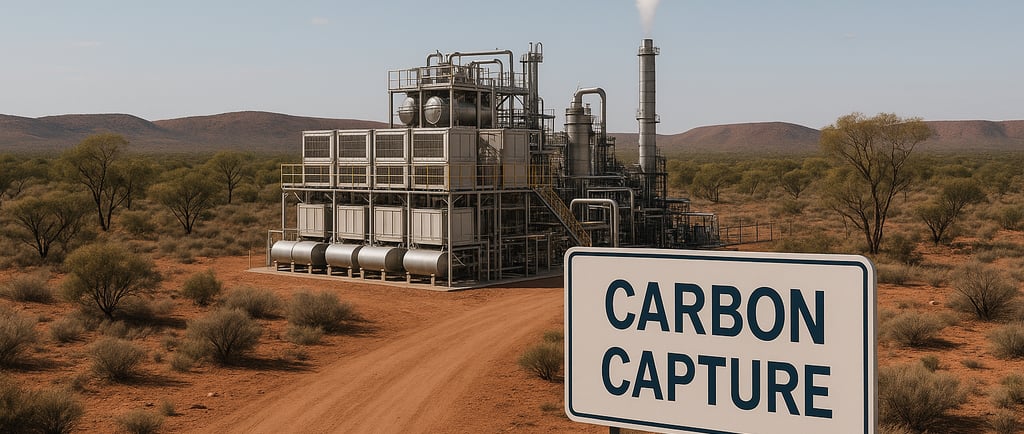Carbon Capture in Australia: Promise or Pitfall for Remote Regions?
Australia’s vast outback holds enormous potential for carbon capture and storage (CCS). In this post, we’ll explore whether CCS could empower rural economies or if its pitfalls outweigh the potential in remote Australia.
INNOVATION
8/2/20252 min read


Australia’s Push into Carbon Capture: An Overview
Australia’s climate strategy increasingly incorporates carbon capture and storage/utilisation (CCS/CCUS) and carbon dioxide removal (CDR) alongside renewables.
The federal government’s Carbon Capture Technologies Program (CCTP) awarded around AUD 65 million in 2024 to seven R&D and demo projects targeting “hard‑to‑abate” sectors and direct air capture.[1]
Alongside, the federal government allocated approximately AUD 550 million for CCS supply chain development in the latest budget, plus AUD 556 million to Geoscience Australia for mapping geological storage potential.[2]
State governments vary in their commitment.
Western Australia has a dedicated CCUS action plan.[3]
Queensland recently blocked Glencore’s CCS pilot over groundwater risk to the Great Artesian Basin.[4]
Today, aside from Chevron’s Gorgon offshore CCS project in WA (which hasn’t yet met its targets), there are no operating large-scale CCS projects onshore.[5]
Pros of CCS/CCUS in Australia
• Decarbonisation of heavy industry: CCS can reduce emissions in sectors like cement, steel and gas processing.[6]
• Economic diversification & job creation in rural regions: Infrastructure and jobs in regional zones.[7]
• Export opportunities and Australia as a CCS hub: Export services to carbon-intensive neighbours.[8]
• Geological advantages: Suitable sedimentary basins onshore and offshore.[9]
• Support for Indigenous and community engagement: Best practices emphasize inclusion.[10]
Challenges & Cons
• High cost & economic viability: Commercial viability expected post-2030.[11]
• Environmental & safety risks: Groundwater contamination concerns.[12]
• Reliability concerns: Gorgon project underperformed.[13]
• Delayed progress & lack of scale: Many proposals stalled.[14]
• Criticism as climate delay tactic: Seen by some as prolonging fossil fuel use.[15]
Value to Remote Regions, Pastoralists & Small Communities
Water resource protection: Great Artesian Basin contamination concerns have been raised.[12]
Any CCS must include monitoring and consent. Economic upside: Infrastructure and revenue for landowners.[10]
Participation: Community consultation is key to alignment with local needs.
Implications for Indigenous Communities
Cultural and environmental integrity: Land and water impacts must be evaluated.[10]
Inclusion and leadership: Indigenous-led planning is vital.[10]
Economic sovereignty: Opportunities in training, land management, and partnerships.
Mining Sector & Heavy Industry
Retention of operations: CCS allows continuation with reduced emissions.
Exportable expertise: Domestic CCS solutions can be shared globally.
Final Takeaways
Remote regions & pastoralists: Job creation and infrastructure vs. environmental safeguards.
Indigenous communities: Engagement and leadership vs. land rights protection.
Heavy industry: Mitigation and exports vs. high costs.
Nationwide: CCS hub potential vs. slow progress and funding gaps.
Conclusion
Carbon capture and storage presents potential for decarbonising hard-to-abate sectors and supporting regional development. However, success requires strong governance, environmental protection, and respectful collaboration with affected communities. Properly implemented, CCS can offer climate and economic benefits—especially for remote Australia.
Footnotes
1. Global Carbon Council, DCCEEW
2. The Australian, Global Carbon Council
3. Climate Change Authority, WA Government
4. The Guardian, Reuters, The Australian
5. Energy.gov, Wikipedia
6. Wikipedia, The Australian, CSIRO
7. CO2CRC, WA Government, The Australian
8. Norton Rose Fulbright
9. Wikipedia
10. DCCEEW, Energy.gov, Wikipedia
11. Climate Change Authority, Wikipedia
12. Reuters, The Australian
13. The Guardian
14. The Australian
15. Australia Institute


Far North Consulting Pty Ltd t/a Groundwork Consulting
© 2025 Groundwork Consulting
ABN 77 649 525 806
MAKING GOOD IDEAS WORK
Video Platform Links





